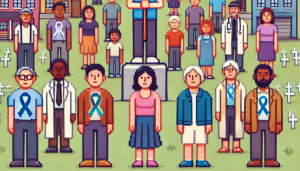
RFK speaks on Vaccines :-(
As misinformation spreads rampant across the globe, issues surrounding public health and vaccines have come into the spotlight. One of the recent high-profile cases involves the decision by the US government to pull $500 million in funding from mRNA vaccine research. This decision, led by the US Health Secretary, claims that these vaccines offer ‘more risk than benefit’ despite substantial scientific evidence indicating otherwise (BBC.)
Health correspondent James Gallagher, in an article for BBC News, questions whether withdrawing such critical funding is the right action. The narrative that vaccines are unsafe only fuels the anti-vaccine sentiment that has been rising post-pandemic.


Spot five differences between these pictures
The Role of mRNA Vaccines
mRNA vaccines have been considered revolutionary in the fight against infectious diseases. This technology played a critical role during the COVID-19 pandemic, efficiently reducing transmission rates and saving countless lives. The claim that mRNA vaccines are no longer effective counters the evidence, which suggests significant safety and effectiveness in large-scale studies (e.g. New Scientist).
Vaccination Rates and Public Health
Vaccine distribution and acceptance are vital to curbing infectious diseases. The decreased funding may slow down momentum in technological advancements crucial for public health, per the United Nations. Reduction in funding not only impacts research but also public trust in essential health measures, hindering global health security and preparedness.
Impact on Global Public Health
The implications of the US decision resonate globally. Since most emerging infectious diseases, like Ebola and new strains of influenza, have relied heavily on mRNA vaccine technology for rapid response, as reported in The Scientist, cutting off funding jeopardizes ongoing and future vaccine developments intended to address such threats.
- Africa’s HIV independence efforts partly hinge on new mRNA treatments. According to the UN, local programs using innovative medicines are being rolled out to improve health self-reliance across the continent
- Research in mRNA technology is also part of the UN’s goal to address non-communicable diseases such as cancer. Discontinuation in funding could delay global efforts to eradicate these deadly diseases, led by advancements in genomics and personalized medicine.
Public Health Responses
Worldwide public health communities are facing a dilemma given the double-edged sword of vaccine skepticism and the growing need for vaccinations amidst health crises. Drilling down to health inequities, vaccine misinformation aggravates already existing barriers in lower-income countries, uprooting significant enough trust issues in medicine accessibility
Future Prospects and Challenges
Proponents of public health urge the necessary tools and infrastructure solutions to bolster vaccine delivery systems. Strategic global collaborations among international agencies and local governments, with funding restored and appropriately allocated, will make substantial progress
Efforts addressing vaccine misinformation through educational platforms and community engagement are integral to counterbalance politically and media-driven narratives that undermine trust. Stakes are consequential as the rate of vaccination directly correlates with the ability to control a pandemic in the long term.
Conclusion
The decision to withdraw funding from mRNA vaccine research presents a formidable challenge affecting not only the United States but also global health initiatives aimed at controlling both current and future pandemics. Only by resolving conflicts surrounding vaccine misconceptions can the health landscape emerge resilient and better prepared against the next inevitable public health crisis.



